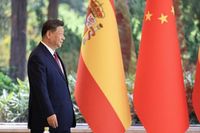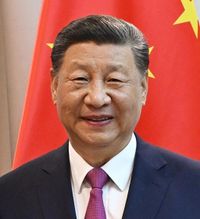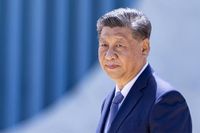The ongoing trade war between China and the United States reached a new peak on Friday, April 11, 2025, as Beijing announced an increase in tariffs on American products from 84% to 125%. This move is a direct response to the recent tariff package imposed by President Donald Trump, which raised tariffs on Chinese goods to 125%, plus an additional 20% base rate, bringing the total to 145%.
In his first public remarks following this escalation, Chinese President Xi Jinping adopted a firm tone, declaring, "There are no winners in a trade war" and accusing the US of moving towards "self-isolation" by confronting not just China but the international community as a whole. Xi emphasized that the trajectory of China's development over the past seven decades has been built on the pillars of self-sufficiency and internal effort, without relying on external assistance.
During a bilateral meeting with Spanish Prime Minister Pedro Sánchez, Xi called on the European Union to form a united front with China against what he termed the US's "unilateralism and economic coercion." This initiative aims to enhance international cooperation to defend the commercial interests of countries affected by the new American tariff structure.
The financial markets reacted swiftly to the news, with global stock exchanges experiencing significant declines amid fears of further developments in the trade war. Analysts noted that the effects are already beginning to impact global supply chains, particularly in the technology, energy, and food sectors. American products like natural gas, coal, and grains are among the hardest hit by the new Chinese tariffs.
In addition to the retaliatory measures, China has filed a formal complaint with the World Trade Organization (WTO), arguing that the actions taken by the US violate international norms of multilateral trade. According to China’s Ministry of Commerce, the American stance is "intimidating" and lacks a practical economic basis, describing it as a "numbers game" that contributes little to the balance of global trade.
This latest round of trade sanctions signals a deeper rupture between the two largest economies in the world. While China has indicated that it does not plan to raise tariffs beyond the announced 125% for the time being, it has made it clear that new countermeasures will be considered if its interests are threatened again. The United States, on the other hand, defends its tariffs as necessary mechanisms to correct historical imbalances in trade and combat practices deemed unfair.
However, there is growing isolation for the White House as international criticism mounts, highlighting the systemic risks posed by its aggressive tariff strategy. More than just a bilateral dispute, the trade war between the US and China is affecting the dynamics of global trade, leading to legal uncertainties, a pullback in investments, and revisions of international contracts.
Economists are warning that the prolonged conflict could slow global economic growth in 2025, complicating the recovery of emerging markets and placing additional pressure on global consumption. In the meantime, China remains committed to resilience and diplomacy to uphold its position. "Opposition to the world is not sustainable," Xi Jinping stated, sending a direct message to the US's isolationist strategy. This stance from Beijing indicates a more proactive international repositioning that could redefine geoeconomic alliances in the coming months.
On the same day, President Xi Jinping made it clear that China is "not afraid" in the face of the trade war with the United States. "There are no winners in a trade war, and going against the world will only lead to self-isolation," he remarked during a meeting with Spanish Prime Minister Pedro Sánchez in Beijing, as reported by state broadcaster CCTV.
Xi reiterated that for over 70 years, China's development has been grounded in self-reliance and hard work, stating, "China has never relied on charity from others and does not fear any unjust repression." He added, "Regardless of how the external environment changes, China will remain confident and focused on managing its own affairs." This statement reflects a determination to maintain stability and growth in the face of external pressures.
The trade tensions have escalated significantly since January when the Trump administration first announced a 10% tariff on Chinese imports. In March, this tariff was raised to 20%, leading China to retaliate with tariffs of up to 15% on American agricultural products. The situation intensified in April when Trump imposed a 34% tariff on China, prompting a reciprocal response from Beijing.
As the US increased tariffs against China to 125%, setting the overall surcharge at 145%, the economic landscape has become increasingly uncertain. The implications of these tariffs extend beyond immediate financial markets, affecting global supply chains and international trade relationships.
With the potential for further escalation, the international community watches closely. The balance of power in global trade is at stake, and both nations are navigating a complex web of economic diplomacy and competitive strategy. As the situation develops, the outcomes of these tariffs could reshape the future of trade relations not just between the US and China, but across the globe.







